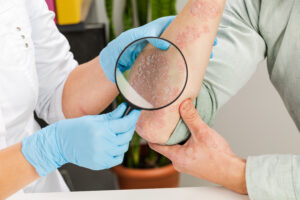The Different Types of Psoriasis and How They Appear on the Skin

The team at Skin Center of South Miami has deep experience treating these variations. You can count on our board-certified dermatologists in South Miami to diagnose the type of psoriasis you have and develop a long-term treatment plan.
Plaque Psoriasis
This is the most common form of psoriasis. It causes raised, inflamed patches covered with silvery-white scales. These plaques often appear on your elbows, knees, lower back, and scalp, but they can show up anywhere. Your skin may feel itchy or sore, and during a flare-up, the plaques can crack and bleed.
Guttate Psoriasis
Often triggered by a bacterial infection such as strep throat, guttate psoriasis causes small, drop-shaped spots on your trunk, arms, or legs. It tends to appear suddenly and is more common in children and young adults. The spots are usually pink or red and may be slightly scaly.
Inverse Psoriasis
This type shows up in body folds, like under your arms, behind your knees, or under your breasts. Instead of thick scaling, the skin looks smooth, shiny, and inflamed. Because it affects areas where skin touches skin, friction and sweating can make the symptoms worse.
Pustular Psoriasis
Pustular psoriasis can cause white, pus-filled bumps surrounded by red skin. It may be limited to your hands and feet or cover larger areas of your body.
This form may require prompt medical care, so it's important to contact a dermatologist right away if you notice symptoms like these.
Erythrodermic Psoriasis
This is the rarest and most severe form. It causes widespread redness, peeling, and intense itching or burning. Your skin may feel hot and swollen, and the condition can disrupt your body temperature and fluid balance.
Erythrodermic psoriasis may require hospitalization and is usually treated with systemic medications and supportive care.
Talk to a Dermatologist in South Miami or Pinecrest
If you think you may have psoriasis, don’t wait for your symptoms to get worse. Skin Center of South Miami offers a range of treatment options, including XTRAC laser therapy for certain types of psoriasis.
Call 305-740-6181 to schedule an appointment and start feeling more in control of your skin again.